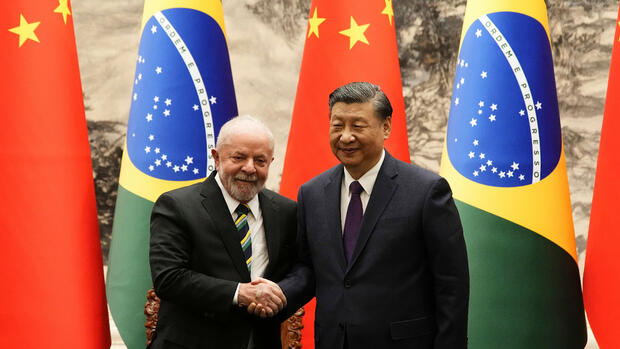Salvador, Beijing China’s state and party leader would have liked to see Brazil’s President Luiz Inácio Lula da Silva come to Beijing three weeks ago to kick off the current round of political visits. If only he could have signaled to the Europeans even more clearly that China has alternatives.
But because of pneumonia, Lula had to postpone his trip to the People’s Republic. Now he joins Spain’s Prime Minister Pedro Sanchez, French President Emmanuel Macron and EU Commission President Ursula von der Leyen.
Still, for Xi, Lula is “not just another head of state making a pilgrimage to Beijing,” said Alicia Garcia Herrero, chief economist for Asia-Pacific at French investment bank Natixis.
Given its size and strategic location, Brazil is a very important player “to tip the balance in favor of a united global south that is willing to follow China’s global leadership.”
Xi called on Lula at Friday’s joint meeting to “promote the development of the global system of governance in a more just and reasonable direction,” which sincerely defends the common interests of developing countries.
According to Chinese sources, Lula promised to deepen relations with China. This is linked to the strategic aim of “creating a just and reasonable international order”.
At the start of his three-day trip to China, Lula gave a speech on Thursday calling on developing countries to work towards replacing the US dollar with their own currencies in international trade.
“Every night I wonder why all countries have to base their trade on the dollar,” he said, speaking at Shanghai’s New Development Bank, known as the “BRICS Bank.” This was well received by the Chinese audience. His request supports Beijing’s efforts to end the dollar’s dominance in global trade.
Brazil announced last week that it would set up a local infrastructure to process transactions in the Chinese currency, the renminbi. However, so far there are only 20 renminbi clearing centers worldwide, says economist Garcia Herreo. This “does not really affect” the role of the US dollar as the world reserve currency.
Lula can’t win China for “Peace Club”.
Lula’s hope of recruiting Xi into his “peace club” of independent powers to mediate in the Ukraine conflict has not materialized. The official Chinese statement only says that there is “agreement that dialogue and negotiations are the only right way to solve the crisis in Ukraine”.
Together, the two heads of state called on other countries to play a constructive role in resolving the conflict. No concrete suggestions were made.
The Chinese government is thus undeterred by its previous positions. Despite the Russian invasion of Ukraine, it is committed to its close partnership with Russia.
The Brazilian president actually wanted to use the Beijing trip to sharpen his foreign policy profile: Lula wants to play an important geopolitical role. He is repositioning Brazil as a climate protector after his predecessor Jair Bolsonaro left behind an environmental disaster. Lula hopes that on this basis he can again negotiate on an equal footing with the world powers.
>>Read also: Lula 100 days in office: German industry relies on Brazil’s comeback
“Brazil wants to act as a global player again or moderate the BRICS countries,” says Oliver Stuenkel, Professor of International Politics at the Fundação Getúlio Vargas University in São Paulo. “Brazil’s neutral position is a negotiating strategy.”
Economically, the trip was rather disappointing for Lula. Brazil’s President had arrived with the largest delegation in a long time: eight ministers, over 200 entrepreneurs, two dozen members of Congress and governors accompanied him. But the joint agreements remained vague.
Brazil is an important supplier of raw materials to China
The second largest economy in the world is Brazil’s most important trading partner. In Lula’s first two terms, from 2003 to 2009, China rose from insignificant to dominant trading partner.
A quarter of all Brazilian foreign trade is now with China. The South Americans mainly exported soya, iron ore and oil to the Far East. Brazil’s agricultural industry is important for supplying China with food. China has also recently opened the market to Brazilian imports for beef and corn.
However, Brazil is bothered that trade relations between the two countries are asymmetrical. The country has a trade surplus with China. By far the largest South American economy exports around 50 percent more to Asia than vice versa. But it’s mostly raw materials.
Lula wanted to change that on his trip to China. In the run-up, there was talk of hydrogen projects and cooperation on satellites. The Brazilian aircraft manufacturer Embraer should also get better access in China. But so far only 15 letters of intent have been signed.
There was also no agreement on possible accession to China’s flagship infrastructure project, the BRI Silk Road Initiative. This makes Brazil one of the last countries in South America not to participate in BRI.
So far, however, state projects between China and Brazil have not been very successful: there is a binational infrastructure fund with generous financial resources, which has hardly been used to date. Chinese state-owned companies have repeatedly announced projects in Brazil, which then got stuck in the bureaucracy.
Investments in which Chinese corporations acquired companies through privatizations or concessions are more successful. Today, Chinese energy companies dominate power generation and distribution in the state of São Paulo.
More: Standing up to the West together – How China wants to take over the BRICS countries in a bloc formation.
